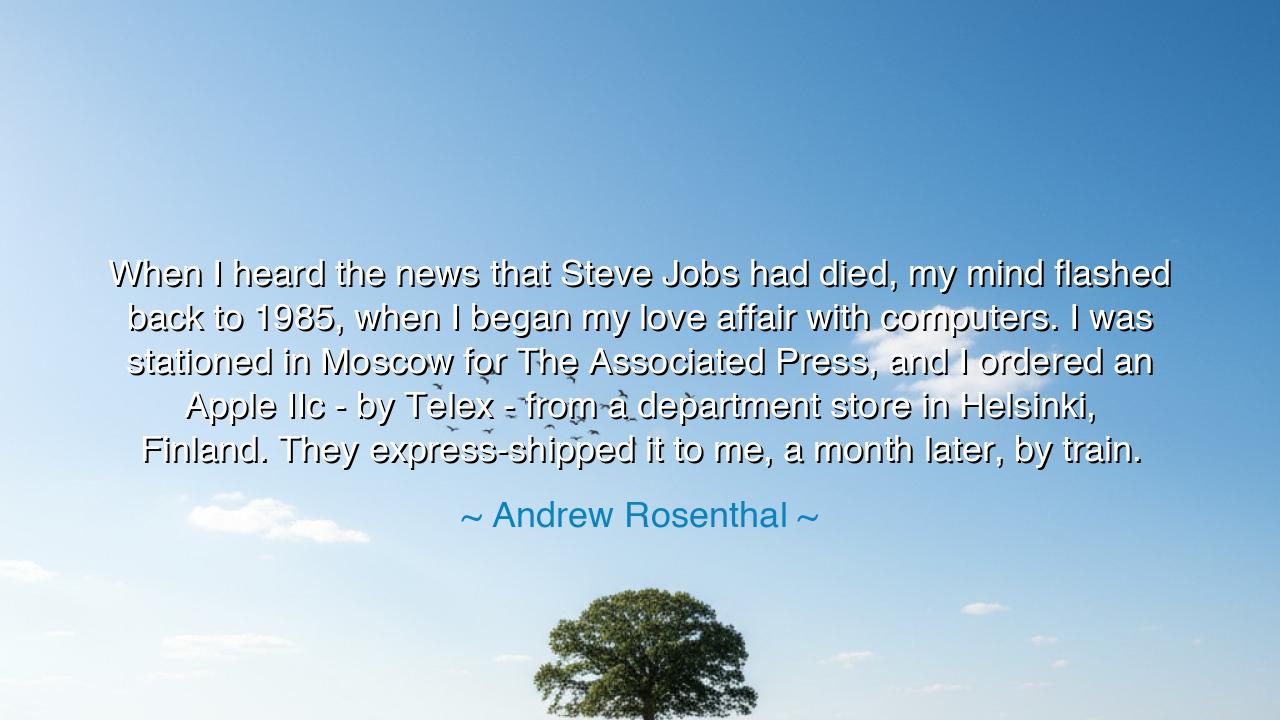
When I heard the news that Steve Jobs had died, my mind flashed
When I heard the news that Steve Jobs had died, my mind flashed back to 1985, when I began my love affair with computers. I was stationed in Moscow for The Associated Press, and I ordered an Apple IIc - by Telex - from a department store in Helsinki, Finland. They express-shipped it to me, a month later, by train.






In the reflective and heartfelt words of Andrew Rosenthal, we find a bridge between two worlds — the old and the new, the analog and the digital, the intimate and the infinite: “When I heard the news that Steve Jobs had died, my mind flashed back to 1985, when I began my love affair with computers. I was stationed in Moscow for The Associated Press, and I ordered an Apple IIc — by Telex — from a department store in Helsinki, Finland. They express-shipped it to me, a month later, by train.” These words, though simple in form, are a testament to the wonder of progress and the enduring power of human curiosity. In them, Rosenthal speaks not merely of technology, but of connection — between people, ideas, and the slow, magnificent unfolding of human innovation.
In the ancient spirit of discovery, man has always sought tools that could extend the reach of his thought. Fire, the wheel, the printing press — each invention marked a leap in the evolution of human possibility. So too did the computer become the fire of the modern age, igniting a new realm of imagination. Rosenthal’s story begins not in the gleaming offices of Silicon Valley, but in Moscow, in 1985 — a city shrouded in the tensions of the Cold War, where the boundaries of communication were both political and physical. There, a journalist reached across the barriers of nations and systems, using a humble Telex — a machine of clacking keys and electric pulse — to summon an object of the future: an Apple IIc. It was not merely a purchase; it was a pilgrimage.
The Apple IIc, born from the mind of Steve Jobs, was more than metal and circuits — it was a vessel of dreams. It brought to ordinary men and women the power once reserved for the great institutions of the world: the power to create, to write, to compute, to imagine without limit. Rosenthal’s recollection, triggered by the death of Jobs, reveals how deeply technology had intertwined with human experience. The train that carried that computer across continents was not just a transport of goods; it was a symbol of humanity’s hunger to connect — the eternal movement from isolation to communion, from distance to understanding.
When Rosenthal describes that moment — a month-long wait for a single machine — we glimpse something profound that the ancients themselves would have recognized: that the worth of knowledge lies in the effort to attain it. In an age where information travels faster than thought, his memory reminds us of a time when every innovation was a treasure, when anticipation was sacred, and when each new tool represented a victory of human will over limitation. Just as the scholars of Alexandria once waited months for a single scroll, so did he wait for his Apple IIc — not with impatience, but with reverence.
Consider the story of Gutenberg, who spent years perfecting his printing press in the 15th century, knowing that it would change the fate of mankind. His invention broke the chains of ignorance, spreading knowledge beyond the walls of monasteries and palaces. So too did Steve Jobs, centuries later, carry that same flame forward. He placed in the hands of humanity a modern instrument of expression, a canvas for the mind. And Rosenthal’s act of ordering that computer from afar was, in truth, an act of faith in the same spirit — a belief that through technology, one could join the great conversation of civilization.
Rosenthal’s memory also bears the tone of nostalgia and gratitude — the kind that comes only from witnessing the passing of an age. When he heard of Jobs’s death, he was not mourning merely the man, but the passing of a generation of dreamers who dared to merge art and engineering, intuition and invention. His words are a quiet elegy for the wonder of that time — when computers were not yet commonplace, and to touch one was to glimpse the divine. It was a time when creation felt new again, when every beep, every line of code, every glowing screen felt like magic born from human hands.
Let this, then, be the lesson drawn from Rosenthal’s reflection: reverence for innovation, and gratitude for those who create it. Do not take for granted the miracles that surround you. The devices we hold today — sleek, instant, and invisible in their labor — are the descendants of the dreams carried by train from Helsinki to Moscow, and the dreams of those who dared to build them. Remember that behind every great tool lies the spirit of a creator, and behind every creation lies a seeker who believed in the unseen.
So, O listener, if ever you find yourself in an age of convenience, take a moment to remember the journey that brought you here. Approach each tool, each idea, with the same wonder that Andrew Rosenthal felt for his Apple IIc. Use it not only for speed and comfort, but for creation, for connection, for truth. For as the ancients taught and as Rosenthal reminds us, the tools we make are reflections of ourselves — and when used with purpose, they do not just shape the world; they shape the soul of humanity itself.






AAdministratorAdministrator
Welcome, honored guests. Please leave a comment, we will respond soon